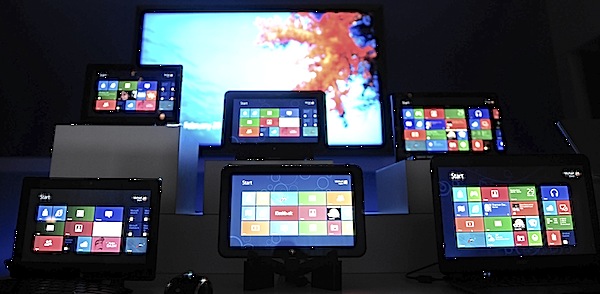I applaud Windows 8 versions because I remember pure XP

I certainly hadn't planned on responding to a story written in 2003 today. But, hey, the Internet's memory is better than an elephant's -- and I've been called to task for "forgetting". Most certainly I did not forget. Circumstances changed.
Yesterday, while waiting for my 90 year-old father-in-law at the optometrist, I got out my smartphone and started scanning Tumblr posts. One led to a Time magazine story about the "Hug Me Coke Machine", which I Tumblred hours late. While at Time's site, I spied something else: "Windows 8 Versions: The News Is Mostly Good" by Harry McCracken. He referred back to my old CNET story "Windows faces new competition: Itself", about fragmenting versions, and contrasted it against my more recent musings for BetaNews. Thanks for remembering, Harry.
XP Fragmented
Microsoft launched Windows XP with two versions: Home and Professional, but quickly added more: Embedded, Media Center, Tablet PC and 64-bit, among them. End users could easily buy 32-bit or 64-bit Home and Pro editions but not Embedded, Media Center or Tablet (and much later Starter), which shipped on new hardware -- like Windows RT will, presumably, later this year. I observed then that Microsoft confused customers by fragmenting Windows and attempted to artificially create competition in a monopoly market.
People want choice, and there was little of it and for many; the existing Windows installed on corporate and consumer PCs was good enough. Microsoft wanted to create competition that might spur upgrades. The strategy failed -- more on the significance later.
The XP fragmentation story posted in April 2003, within weeks of my leaving CNET and joining Jupiter Research as analyst responsible for the Microsoft practice. Two-and-half years later, I met Microsoft product managers to discuss Windows Vista. The company planned to greatly expand the number of Windows editions but, in the end, not as many as discussed during that meeting.
Whither Windows 8
Now fast forward to this week's announcement, where Microsoft modestly trimmed Windows 8 editions. For the majority of non-Chinese speaking users there are two: Windows 8 and Pro. This is the software that will ship on new PCs or you can buy to upgrade Windows 7 systems. These are largely comparable to Windows XP Home and Pro. Microsoft also will keep the Enterprise Edition introduced with Windows Vista that is available only through volume-licensing and release a Chinese-language Windows 8 version. Like Windows XP Tablet PC Edition, the new Windows RT, for devices running on ARM processors, will be available only on new hardware.
That brings me to McCracken's story. He writes:
People somtimes pine for the Windows XP era and talk about XP coming in just two well-defined editions: Home and Professional. (Here’s Joe Wilcox recently doing that -- even though he wrote that 2003 article about the excessive number of XP versions.) They seem to be forgetting that XP is where the concept of endless specialized versions of Windows began. You had your Tablet PC Edition, your Media Center Edition, your Starter Edition, forgotten variants such as Windows XP for subscription computers.
I agree that "XP is where the concept of endless specialized versions of Windows began". But Windows XP also started with only two versions, in October 2001, and that's my point in the stories McCracken references and the newest: "Three Windows 8 versions is just right". I don't drum on about the endless XP versions because they're no more. The hardware-only versions are way out of vogue, if you can find them for sale anywhere at all. The editions that matter -- the ones installed on hundreds of millions PCs are Home and Pro, sprinkled with a little Starter for good measure.
Remember This
I didn't forget; what happened to Windows XP editions between 2003 and 2007 isn't relevant to the current discussion or what's available in the market. But getting back to basics -- two versions for x86 processors that end users can buy and install -- is. Meaning: What Microsoft released in October 2001. As I've repeatedly expressed, one Windows would be even better -- going even more back to basics. Windows 95 was one version for businesses and consumers. That's the ideal product scenario: Windows 8 for x86 and Windows RT for ARM, and nothing more.
Windows XP Media Center and Media Center editions were market failures. They sold poorly. Microsoft tried to recoup them and artificially create choice by expanding the number of editions with Windows Vista. Ultimate replaced Tablet PC and Media Center. Today Microsoft sells six Windows 7 editions, three at retail (Home, Professional and Ultimate), which is tacit admission the number is too many. Basic and Starter come on new computers and Enterprise is volume-license only.
The big difference is something I predicted in February 2006, which sets apart the versioning strategy adopted with Windows Vista from that extended from two Windows XP editions: "The version strategy may also allow Microsoft to do something not done in more than a decade: Raise desktop operating system prices, a tact that can be difficult to take in a market where one product dominates and where monopoly and a contentious antitrust case cast long shadows". That's exactly what happened by introducing Ultimate and strong-arm licensing tactics for Enterprise (Microsoft demands enterprises use this edition, which also requires paying extra for Software Assurance).
I didn't forget. I made reference to what was Windows XP at launch and what it is today as widely-deployed software: Home and Pro. Then there is what Microsoft did with new editions later on: Effectively raise prices in a non-competitive market. Everyone would be wise to remember that and wonder, with increased competition from non-PC devices and Macs running other operating systems, what Microsoft will charge end users, OEMs and volume-license subscribers for Windows 8.